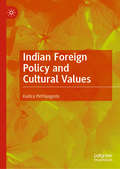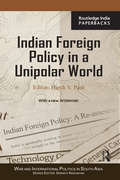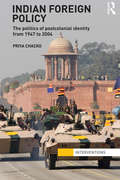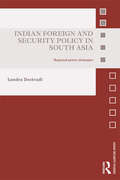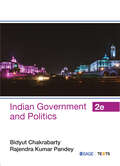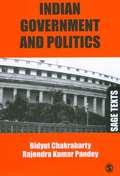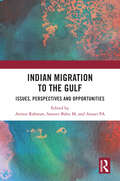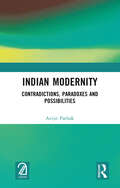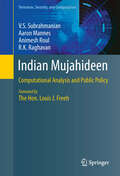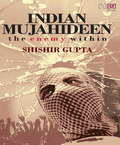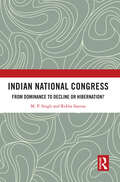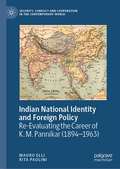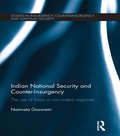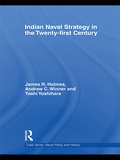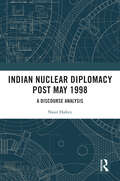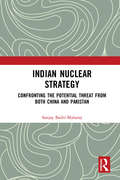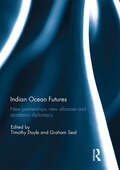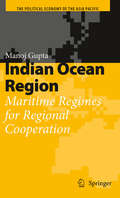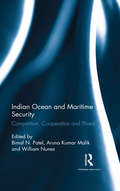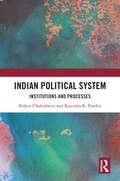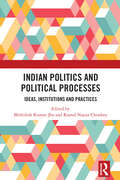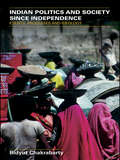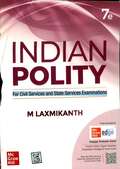- Table View
- List View
Indian Express [Fri, 24 Nov 2017]
by Indian ExpressArticles in this issue: Muslim cleric, his two relatives beaten up in train in UP: FIR Durga principal Goddess…court over-reaching: I&B tells Kerala High Court Like Congress, like BJP: Nine prime acres for a song — this time for Gita Research Centre
Indian Foreign Policy and Cultural Values
by Kadira PethiyagodaAs India rises to great power status in the emerging multipolar world order, what influence will its rich and ancient culture have on the country’s foreign policy? This book reveals that cultural values have greater explanatory power than previously thought and describes the nature of their influence. Excavating thousands of years of history, the monograph identifies enduring values that are relevant to contemporary foreign policy. It examines three critical areas of Indian foreign policy – nuclear policy, humanitarian intervention and relations with the Middle East. Major decisions were shaped by cultural values – sometimes at the expense of strategic interests. India’s choice to test nuclear weapons was not purely because of China or Pakistan: hierarchy also played a role. From a hierarchical worldview shaping Delhi’s approach to international law on arms control to pluralism facilitating simultaneous friendships with America and Iran, values thread their way throughout India’s foreign relations. Non-violence underpins Delhi’s soft power in both the West and the Middle East, while having spurred India’s opposition to Western intervention in Iraq. Analyzing state behavior and interviewing diplomats, the book charts culture’s evolving influence from Rajiv Gandhi to Narendra Modi.
Indian Foreign Policy in a Unipolar World (War And International Politics In South Asia Ser.)
by Harsh V. PantIndia's foreign policy, out of the structural confines of the Cold War strategic framework, has become more expansive in defining its priorities over the last few years. With the rise of its economic and military capabilities and strategic interests, India has shaped a diplomacy that is much more aggressive in the pursuit of those interests. Tracing the trajectory of India's foreign policy in the 21st century, this book examines the factors that have shaped the Indian response towards this emerging international security environment. Including a new Afterword, this updated volume looks at the major influences that have shaped India's foreign policy in recent years, in the context of its engagements with strategically important regions across the globe, and its relations with major global powers.The volume will prove invaluable to those studying politics and international relations, diplomatic and political history, defence and military studies, and South Asian studies.
Indian Foreign Policy: The Politics of Postcolonial Identity from 1947 to 2004 (Interventions)
by Priya ChackoThe rise of India as a major power has generated new interest in understanding the drivers of its foreign policy. This book argues that analysing India’s foreign and security policies as representational practices which produce India’s identity as a postcolonial nation-state helps to illuminate the conditions of possibility in which foreign policy is made. Spanning the period between 1947 and 2004, the book focuses on key moments of crisis, such as the India-China war in 1962 and the nuclear tests of 1972 and 1998, and the approach to international affairs of significant leaders like Jawaharlal Nehru. The analysis sheds new light on these key events and figures and develops a strong analytical narrative around India’s foreign policy behaviour, based on an understanding of its postcolonial identity. It is argued that a prominent facet of India’s identity is a perception that it is a civilizational-state which brings to international affairs a tradition of morality and ethical conduct derived from its civilizational heritage and the experience of its anti-colonial struggle. This notion of ‘civilizational exceptionalism’, as well as other narratives of India’s civilizational past, such as its vulnerability to invasion and conquest, have shaped the foreign policies of governments of various political hues and continue to influence a rising India.
Indian Foreign and Security Policy in South Asia: Regional Power Strategies (Asian Security Studies)
by Sandra DestradiThis book examines Indian foreign policy and security relations in its eastern regional neighbourhood. Indian Foreign and Security Policy in South Asia conducts an in-depth analysis into India’s foreign policy towards the three main countries in India’s Eastern neighbourhood – Sri Lanka, Nepal, and Bangladesh. In particular, it deals with India’s role in the final years of the civil war in Sri Lanka, its approach to the peace and democratisation process in Nepal, and Indian foreign policy towards Bangladesh on a range of issues including Islamist militancy, migration, border security, and insurgency. Set within an analytical framework centred on the notions of ‘empire’, ‘hegemony’, and ‘leadership’, the study reveals that India pursued predominantly hegemonic strategies and was not able to generate genuine followership among its smaller neighbours. The South Asian case therefore shows the discrepancy that may exist between the possession of power capabilities and the ability to exercise actual influence: a conclusion which lifts the study from geographical specifics, and extends its relevance to other cases and cross-regional comparisons. This text will be of much interest to students of Indian foreign policy, Asian security, foreign policy analysis, strategic studies and IR in general.
Indian Government and Politics
by Bidyut Chakrabarty Rajendra Kumar PandeyThis revised edition of the bestselling textbook explains the development, activities and complexities of Indian government and politics and its contemporary aspects. Adopting a multi-disciplinary approach, Indian Government and Politics, 2e, offers a refreshingly creative interpretation of foundational ideas, key institutions, democratic processes and states' responses to public aspirations. It unearths new areas of inquiry by posing pertinent questions on the nature of Indian politics and functioning of the government. The book studies how the political institutions have emerged and changed since the end of the colonial rule in the country. Its strength lies in its focused content and analytical rigour that help readers to critically engage with the political happenings in India. This edition will continue to serve as a standard textbook for UG and PG students of political science and public administration. It will also act as an incisive manual for UPSC and civil service aspirants. Key Features: • Continues to help build a solid theoretical--conceptual foundation on the nature and texture of Indian politics • Thoroughly updated and revised chapters to reflect recent developments in Indian politics • Six additional chapters on the nature of Indian state, fundamental rights and directive principles of state policy, public services, electoral process, corruption and machinery for redressal of public grievances and social movements • Introduction of pedagogical features such as Did You Know boxes, brief bio-notes of eminent writers of Indian politics and mid-chapter exercises to aid self-learning and assessment
Indian Government and Politics: Competitive Exam
by Bidyut Chakrabarty Rajendra Kumar PandeyIndian Government and Politics will serve as a standard textbook for undergraduate students of Political Science and Public Administration. It is also an incisive manual for the candidates appearing for various UPSC and civil service examinations, besides being invaluable for students and researchers of political science in general, and post-colonial contemporary Indian politics in particular. The book explains the complexities of the Indian political process and its effects on the constitutional institutions of India. Adopting a multi-disciplinary approach, it takes a fresh look at the socio-political and economic scenario of contemporary India and unearths new areas of inquiry by posing pertinent questions on the nature of Indian politics. The strength of the book lies in its focused content, which thoroughly analyses the political happenings in India and studies how the political institutions have emerged and changed since the end of colonial rule in the country.
Indian Migration to the Gulf: Issues, Perspectives and Opportunities
by Anisur Rahman, Sameer Babu M, and Ansari P AThis book explores issues of rights, issues, and challenges faced by Indian migrant workers in the GCC countries. It focuses on the struggle of migrants in the state of origin and destination states and how the process of migration shapes the identity and existence of migrant workers. The essays in the volume focus on policy, rights, issues, and challenges faced by migrants as well as the long-term challenges posed by the COVID-19 pandemic. With contributions from academics and policymakers, this book will be of interest to scholars and researchers of migration and diaspora studies, public policy, and South Asian Studies.
Indian Modernity: Contradictions, Paradoxes and Possibilities
by Avijit PathakIndian Modernity (first published in 1998) acquires a new meaning today. While it critiques a techno-militaristic model of modernization, it visualizes alternative possibilities to give a distinctively new definition to our modernity. It engages the reader in dreaming of a new path to modernity beyond its present contradictions and paradoxes with its lyrical style, philosophic insights, sensitivity to deep religiosity, life-affirming femininity and, most of all, sociological imagination. This book continues to hold relevance for social science students and researchers, teachers, and visionaries, despite the passage of time. This title is co-published with Aakar Books. Print editions not for sale in South Asia (India, Sri Lanka, Nepal, Bangladesh, Pakistan and Bhutan)
Indian Mujahideen
by V. S. Subrahmanian Aaron Mannes Animesh Roul R. K. RaghavanAdvance Praise for Indian Mujahideen: Computational Analysis and Public Policy "This book presents a highly innovative computational approach to analyzing the strategic behavior of terrorist groups and formulating counter-terrorism policies. It would be very useful for international security analysts and policymakers. " Uzi Arad, National Security Advisor to the Prime Minister of Israel and Head, Israel National Security Council (2009-2011) "An important book on a complex security problem. Issues have been analysed in depth based on quality research. Insightful and well-balanced in describing the way forward. " Naresh Chandra, Indian Ambassador to the USA (1996-2001) and Cabinet Secretary (1990-1992). "An objective and clinical account of the origins, aims, extra-territorial links and modus-operandi, of a growingly dangerous terrorist organization that challenges the federal, democratic, secular and pluralistic ethos of India's polity. The authors have meticulously researched and analysed the multi-faceted challenges that the "Indian Mujahideen" poses and realistically dwelt on the ways in which these challenges could be faced and overcome. " G. Parthasarathy, High Commissioner of India to Australia (1995-1998) and Pakistan (1998-2000). This book provides the first in-depth look at how advanced mathematics and modern computing technology can influence insights on analysis and policies directed at the Indian Mujahideen (IM) terrorist group. The book also summarizes how the IM group is committed to the destabilization of India by leveraging links with other terror groups such as Lashkar-e-Taiba, and through support from the Pakistani Government and Pakistan's intelligence service. Foreword by The Hon. Louis J. Freeh.
Indian Mujahideen
by Shishir GuptaRecent acts of terror have exploded the myth that Indian youth is insulated from the global terrorism phenomenon and had little time for extremism. The communal riots post the 1992 incident, the rise of the Students Islamic Movement of India (SIMI) and the mutation of a section of aspiring Muslim youth into terrorists with the help of forces across the border. The story of home-grown jihadists would have been skewed had it not been for the testimonies of David Coleman Headley and Sarfaraz Nawaz on the involvement of the Pakistan Inter-Services Intelligence, top Lashkar-e-Taiba leadership, the Al Qaida and the Karachi project, whose demon child the Indian Mujahideen is. This book is the first-ever attempt to link up jihadists all over India and trace their linkages with terrorists based in countries like Pakistan, Nepal, Sri Lanka, Bangladesh, United Arab Emirates, Oman, Yemen and Saudi Arabia.
Indian National Congress: From Dominance to Decline or Hibernation?
by Rekha Saxena M. P. SinghThis book presents a systematic analysis of the rise and decline of the Indian National Congress since 1980s, using the frame dominance to hibernation. The Indian National Congress (INC or Congress Party) originated in the national movement for India`s freedom and has since been the centerpiece of post-Independence multiparty system for nearly four decades. However, the Congress has been experiencing a phase of serious decline since the 2014 and 2019 General Elections. Analyzing years of political history and contemporary developments, this volume brings to the fore important issues and key themes such as, • Evolution of party system in India, the contemporary dynamics and movements; • Indian National Congress under Indira Gandhi and Rajiv Gandhi; • Ideological and policy reorientation of the party in 1990s under P. V. Narsimha Rao; • Revival of mass membership and organizational elections in the party; • Indian National Congress in the 2000s, under the leadership of Sonia Gandhi and Rahul Gandhi; • The 2019 debacle and change in the leadership. A comprehensive work on the history of the Congress Party in India, this volume will be an essential read for scholars and researchers of political science, party politics, Indian politics, sociology, modern Indian history, political sociology, public administration, public policy, South Asian studies, and governance studies.
Indian National Identity and Foreign Policy: Re-Evaluating the Career of K. M. Pannikar (1894–1963) (Security, Conflict and Cooperation in the Contemporary World)
by Mauro Elli Rita PaoliniShedding light on the role of India within twentieth-century international relations, this book explores the life and career of Kavalam Madhava (K. M.) Panikkar (1894–1963), an Indian historian, statesman and diplomat. Having been involved in Indian intellectual and political life throughout the transition from the British Empire to the Nehruvian era, Panikkar was an important figure in the evolution of the modern Indian state. Based on over four years of extensive research both in India and Europe, and the analysis of public writings and unpublished archival documents, this book examines Panikkar’s role in the Indian national movement, the governance of several Princely states, and India’s foreign policy, notably with China. Not only do the authors critically re-evaluate Panikkar’s intellectual and political thoughts, but also his influence on the broader issue of India’s path towards independence. Offering a valuable contribution to modern Indian diplomatic history and wider international relations, this comprehensive book emphasises Panikkar’s importance in shaping the modern idea of India and crucial elements of Indian foreign policy.
Indian National Security and Counter-Insurgency: The use of force vs non-violent response (Studies in Insurgency, Counterinsurgency and National Security)
by Namrata GoswamiThis book, based on extensive field research, examines the Indian state’s response to the multiple insurgencies that have occurred since independence in 1947. In reacting to these various insurgencies, the Indian state has employed a combined approach of force, dialogue, accommodation of ethnic and minority aspirations and, overtime, the state has established a tradition of negotiation with armed ethnic groups in order to bolster its legitimacy based on an accommodative posture. While these efforts have succeeded in resolving the Mizo insurgency, it has only incited levels of violence with regard to others. Within this backdrop of ongoing Indian counter-insurgency, this study provides a set of conditions responsible for the groundswell of insurgencies in India, and some recommendations to better formulate India’s national security policy with regard to its counter-insurgency responses. The study focuses on the national institutions responsible for formulating India’s national security policy dealing with counter-insurgency – such as the Prime Minister’s Office, the Cabinet Committee on Security, the National Security Council, the Ministry of Home Affairs and the Indian military apparatus. Furthermore, it studies how national interests and values influence the formulation of this policy; and the overall success and/or failure of the policy to deal with armed insurgent movements. Notably, the study traces the ideational influence of Kautilya and Gandhi in India’s overall response to insurgencies. Multiple cases of armed ethnic insurgencies in Assam, Manipur, Mizoram, and Nagaland in the Northeast of India and the ideologically oriented Maoist or Naxalite insurgency affecting the heartland of India are analysed in-depth to evaluate the Indian counter-insurgency experience. This book will be of much interest to students of counter-insurgency, Asian politics, ethnic conflict, and security studies in general.
Indian Naval Strategy in the Twenty-first Century (Cass Series: Naval Policy and History)
by James R. Holmes Toshi Yoshihara Andrew C. WinnerThis is the first academic study of India's emerging maritime strategy, and offers a systematic analysis of the interplay between Western military thought and Indian maritime traditions. By a quirk of historical fate, Europe embarked on its Age of Discovery just as the main Asian powers were renouncing the sea, ushering in centuries of Western dominance. In the 21st century, however, Asian states are once again resuming a naval focus, with both China and India dedicating some of their new-found wealth to building powerful navies and coast guards, and drawing up maritime strategies to govern the use of these forces. The United States, like the British Empire before it, is attempting to manage these rising sea powers while preserving its maritime primacy. This book probes how India looks at the sea, what kind of strategy and seagoing forces New Delhi may craft in the coming years, and how Indian leaders may use these forces. It examines the material dimension, but its major premise is that navies represent a physical expression of a society's history, philosophical traditions, and culture. This book, then, ventures a comprehensive appraisal of Indian maritime strategy. This book will be of interest to students of sea power, strategic studies, Indian politics and Asian Studies in general. James R. Holmes is an Associate Professor of Strategy at the U.S. Naval War College and a former U.S. Navy surface warfare officer. Toshi Yoshihara is an Associate Professor in the Strategy and Policy Department at the Naval War College. Andrew C. Winner is Professor in the Strategic Research Department at the U.S. Naval War College.
Indian Nuclear Diplomacy Post May 1998: A Discourse Analysis
by Nasir HafeezThis book explores Indian nuclear diplomacy in post May 1998 and deconstructs the discourse presented in public and private sphere. It shows how India discursively constructed its self image as the promoter of peace and stability not only in the region but in the entire world and employed concerns raised by international community in the prevailing environment to present a discourse that looked sensible and even attractive. The discursive constructions in Indian nuclear diplomacy discourse offer a fresh insight into Indian strategic culture and will draw attention of many scholars and policy makers not only in South Asia but across the world.Scholars and researchers working in the field of discourse analysis, international relations, strategic studies and nuclear non-proliferation will find this book of great interest.
Indian Nuclear Strategy: Confronting the Potential Threat from both China and Pakistan
by Sanjay Badri-MaharajThis book examines India’s nuclear strategy as it confronts the potential threat from both China and Pakistan. The potential threats - traditional as well as non-traditional CBRN threats - will be examined as will India’s approach to dealing with them. India’s nuclear arsenal, its dual purpose civil-military space program and its nascent BMD capability will be explored with a view to informing the reader as to the steps taken by India to confront its nuclear challenges. Please note: Taylor & Francis does not sell or distribute the Hardback in India, Pakistan, Nepal, Bhutan, Bangladesh and Sri Lanka
Indian Ocean Futures: New Partnerships, New Alliances, and Academic Diplomacy
by Graham Seal Timothy DoyleIndian Ocean studies, which once lagged behind studies of the Atlantic and the Pacific, is an important emerging academic field which has come into its own. In the next fifty years, the Indian Ocean Region will become very significant as a result of enormous demographic changes. What was the Ocean of the South is rapidly becoming the Ocean of the Centre, the Ocean of the Future. Curtin University, Western Australia, has a long and distinguished history of engagement with the Indian Ocean region and with Indian Ocean Studies, and its Australia-Asia-Pacific Institute of Curtin University continues to maintain a focus on the Indian Ocean -past, present and future. This book examines a number of themes emerging from its 2014 Conference entitled "Indian Ocean Futures", which attracted some of the best Indian Ocean region scholars. The conference connected humanities, social sciences and scientific disciplines; this book collects some of the preeminent works focused on geo-strategic, cultural, environmental security and human security themes. The book is also an important contribution to the building of academic diplomacy in the region – that is to say, it contributes to region-building by creating epistemic communities and networks between government, the private sector, and academia throughout the region. Through the pursuit of academic diplomacy, academics are capable of pursuing research goals which enhance governmental, business, and civil society objectives of the day. This book was previously published as a special issue of the Journal of the Indian Ocean Region.
Indian Ocean Region
by Manoj GuptaThe Indian Ocean region is arguably one of the world's least understood, yet its importance in geopolitics and international relations is greater than ever before. This book explores the concepts of regime theory, regional orders and ocean governance to critically assess the effectiveness of maritime regimes, something that not been attempted before for the Indian Ocean Region. This study employs the theoretical framework of international regimes in the context of ocean governance by developing a new model, which is used to test the regimes' effectiveness. This book addresses the analytical gap in our understanding about the strategic importance of the Indian Ocean as a region in contemporary world geopolitics and international relations. Case studies display the groundwork for regional cooperation in the maritime realm laid by Indian Ocean countries, and the effectiveness of current political leadership is addressed. There is considerable value in looking at the Indian Ocean as a region for future analysis of maritime regimes, and this book proposes that international maritime regimes can expand regional cooperation in the Indian Ocean to create a new geopolitical region. The interdisciplinary approach presented draws on historical analysis, international maritime law, political science, international relations and the literature on regime theory and will be of interest to academics in those fields as well as policy-makers concerned with maritime issues.
Indian Ocean and Maritime Security: Competition, Cooperation and Threat
by Bimal N. Patel Aruna Kumar Malik William NunesThis book provides a synoptic view of the Indian Ocean and maritime security in its contested waters. Using a historical approach, it reveals vital links to events in the present day. The volume: Highlights the competition between major Asian powers to control the ‘String of Pearls’ — a reference to the Chinese attempts at controlling the Indian Ocean periphery. Shows that cooperation amongst the major powers of the region could abate the threat of the potential of conflict becoming global and inviting external intervention. Discusses India’s Look-East policy and the deepening relation between India and the Association of Southeast Asian Nations (ASEAN). Argues for the need of Indian Ocean states and particularly the South Asian Association for Regional Cooperation (SAARC) members of the Indian Ocean Rim Association (IORA) to look afresh at their political and security issues and common interests. Suggests measures for evolving a robust mechanism of maintaining the Indian Ocean as a sustainable zone of commerce, energy, security and peace rather than threat. A major contribution on a critical area in Asian geopolitics, this volume will be useful to scholars and researchers of international relations, politics, defence studies and maritime security studies, along with strategic affairs experts and think tanks.
Indian Political System: Institutions and Processes
by Bidyut Chakrabarty Rajendra K. PandeyThis volume examines the distinct structural characteristics of Indian politics and unearths significant sociopolitical and economic processes which are critical to the political articulation of governance in the country. It reflects on the foundational values of Indian polity, the emergence of the nation post-colonialism, the structural fluidity of federalism in India, and the changing nature of the planning process in the country. The book also studies the electoral processes, social movements, party system, local and state governance. Apart from analyzing corruption and public grievance systems, the volume also probes into significant issues in Indian politics. This book will be useful to the students, researchers and faculty working in the field of political science, public administration, political sociology, political economy and post-colonial contemporary Indian politics in particular. It will also be an invaluable and interesting reading for those interested in South Asian studies.
Indian Politics and Political Processes: Ideas, Institutions and Practices
by Mithilesh Kumar Jha Kamal Nayan ChoubeyIndian Politics and Political Processes explores the key ideas, foundations, continuities, major shifts and challenges to the state and democracy in modern India. The book presents an in-depth analysis of recent issues and challenges confronting the Indian state and politics. Presenting a comprehensive account of the major trajectories of Indian politics, this book introduces the readers to the existing literature and enables them to think critically about major issues and institutions of politics and democracy. The chapters engage critically with the historical antecedents, major debates, and recent developments. The book also elaborately deals with issues such as populism, religious movements, minority rights, health, and the environment, which are often ignored or side-lined in the available literature on Indian politics and political processes. The book will be useful to the students, teachers and researchers pursuing courses in political science, South Asian Studies, and international/global politics and economics. It will also be an informative read for those interested in contemporary South Asian politics.
Indian Politics and Society since Independence: Events, Processes and Ideology
by Bidyut ChakrabartyFocusing on politics and society in India, this book explores new areas enmeshed in the complex social, economic and political processes in the country. Linking the structural characteristics with the broader sociological context, the book emphasizes the strong influence of sociological issues on politics, such as social milieu shaping and the articulation of the political in day-to-day events. Political events are connected with the ever-changing social, economic and political processes in order to provide an analytical framework to explain ‘peculiarities’ of Indian politics. Bidyut Chakrabarty argues that three major ideological influences of colonialism, nationalism and democracy have provided the foundational values of Indian politics. Structured thematically and chronologically, this work is a useful resource for students of political science, sociology and South Asian studies.
Indian Polity - Competitive Exam: For Civil Services and State Services Examinations - 7th Edition
by M LaxmikanthThe "INDIAN POLITY 7th Edition" by M LAXMIKANTH is a comprehensive guide tailored for aspirants of India's Civil Services and State Services Examinations. The book breaks down the intricate facets of Indian Polity into digestible sections. In the preliminary examination section, it covers the broad spectrum of Indian governance, including the Constitution, Political System, Panchayati Raj, and Rights Issues. The main examination section delves deeper, discussing the historical underpinnings and evolution of the Indian Constitution, the functions and responsibilities of Union and States, and comparisons with other global constitutional schemes. Additionally, the book offers insights into the dynamics of coalition politics, emphasizing its fluid nature, the significance of compromise, and the challenges of operating on a minimum program. This edition serves as an essential resource, aiding students in navigating both preliminary and main stages of their examination journey.
Indian Polity: இந்திய அரசியல்: தமிழ் போட்டித் தேர்வுக்கான 1000 கேள்வி பதில்
by Tamil Competitive Examஇந்நூலில் இந்திய அரசியல் பற்றிய 1000 Q & A தமிழில் கொடுக்கப்பட்டுள்ளன.

